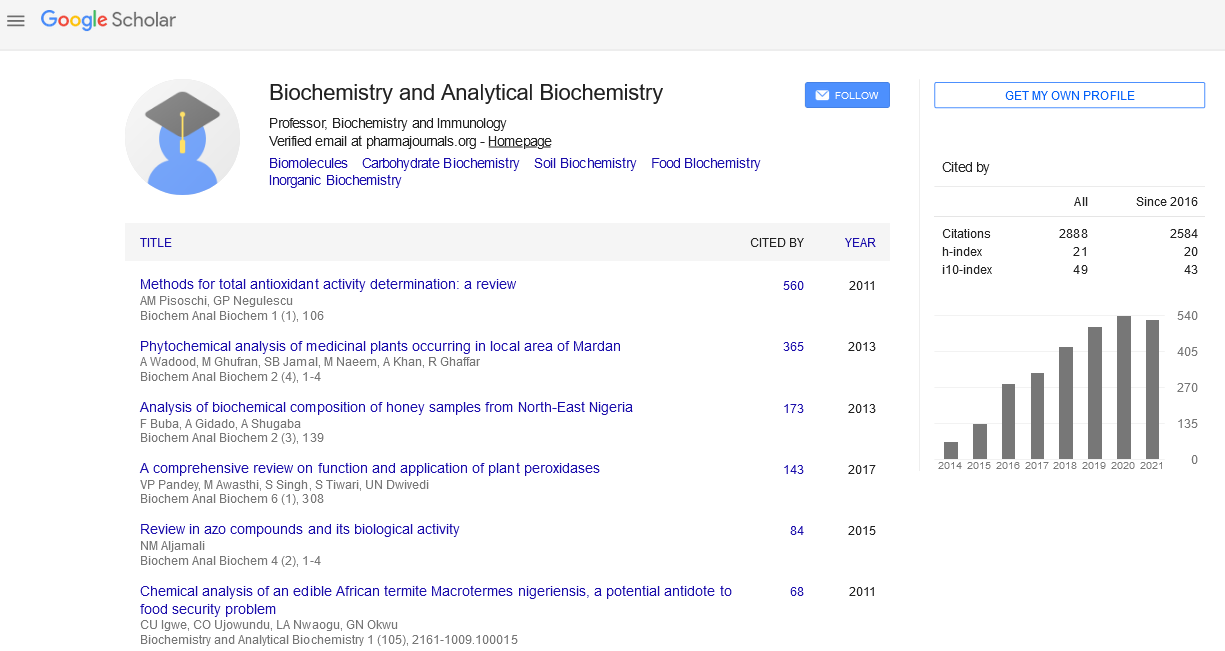Indexed In
- Open J Gate
- Genamics JournalSeek
- ResearchBible
- RefSeek
- Directory of Research Journal Indexing (DRJI)
- Hamdard University
- EBSCO A-Z
- OCLC- WorldCat
- Scholarsteer
- Publons
- MIAR
- Euro Pub
- Google Scholar
Useful Links
Share This Page
Journal Flyer

Open Access Journals
- Agri and Aquaculture
- Biochemistry
- Bioinformatics & Systems Biology
- Business & Management
- Chemistry
- Clinical Sciences
- Engineering
- Food & Nutrition
- General Science
- Genetics & Molecular Biology
- Immunology & Microbiology
- Medical Sciences
- Neuroscience & Psychology
- Nursing & Health Care
- Pharmaceutical Sciences
Homeothermic control based on pre-equilibrium reaction in thermogenic skunk cabbage, Symplocarpus renifolius
International Conference on Biochemistry
October 10-12, 2016 Kuala Lumpur, Malaysia
Yui Umekawa and Kikukatsu Ito
Iwate University, Japan
Scientific Tracks Abstracts: Biochem Anal Biochem
Abstract:
Temperature is one of the most important requirements for all living organisms. To survive in severe environments in which temperature changes continuously, some animals have gained the ability to maintain their temperature during the evolutionary process, called homeothermy, which is performed by a complex mechanism involving thermal receptors throughout the body and integration in the hypothalamus that controls shivering and non-shivering thermogenesis. Interestingly, flowers of some plants show a similar homeothermic behavior by inversely controlled respiration to temperature. To clarify the thermoregulatory mechanism in thermogenic plants, we investigated the temperature response of respiration in vivo using modified Arrhenius model using homeothermic spadices of skunk cabbage (Symplocarpus renifolius). Our results clearly showed that overall thermodynamic activation energy exhibits a negative value in the temperature range in which respiration control occurs. Our results suggest that respiratory control in this plant is achieved by a pre-equilibrium chemical reaction in response to temperature. Moreover, citrate-driven respiration analysis using isolated mitochondria from thermogenic spadices further suggests that chemically endothermic reactions, such as NADPH production catalyzed by mitochondrial isocitrate dehydrogenase are involved in our proposed pre-equilibrium reaction. A law of chemical equilibrium known as Le Chatelier�??s principle may govern the homeothermic control in skunk cabbage.
Biography :
Yui Umekawa is currently pursuing PhD in Biochemistry, Bioenergetics, Molecular Biology at the United Graduate School of Agricultural Sciences, Iwate University, Japan.
Email: u0414001@iwate-u.ac.jp


